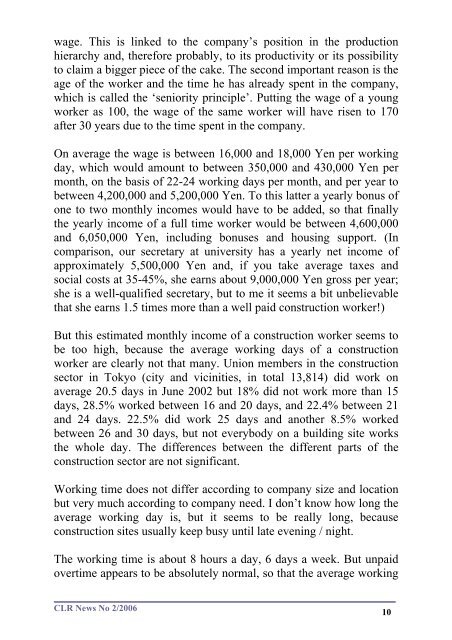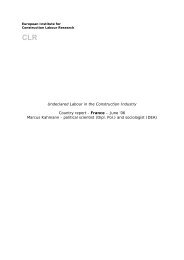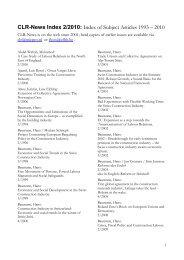Japan – what can we learn? - Construction Labour Research
Japan – what can we learn? - Construction Labour Research
Japan – what can we learn? - Construction Labour Research
Create successful ePaper yourself
Turn your PDF publications into a flip-book with our unique Google optimized e-Paper software.
wage. This is linked to the company’s position in the productionhierarchy and, therefore probably, to its productivity or its possibilityto claim a bigger piece of the cake. The second important reason is theage of the worker and the time he has already spent in the company,which is called the ‘seniority principle’. Putting the wage of a youngworker as 100, the wage of the same worker will have risen to 170after 30 years due to the time spent in the company.On average the wage is bet<strong>we</strong>en 16,000 and 18,000 Yen per workingday, which would amount to bet<strong>we</strong>en 350,000 and 430,000 Yen permonth, on the basis of 22-24 working days per month, and per year tobet<strong>we</strong>en 4,200,000 and 5,200,000 Yen. To this latter a yearly bonus ofone to two monthly incomes would have to be added, so that finallythe yearly income of a full time worker would be bet<strong>we</strong>en 4,600,000and 6,050,000 Yen, including bonuses and housing support. (Incomparison, our secretary at university has a yearly net income ofapproximately 5,500,000 Yen and, if you take average taxes andsocial costs at 35-45%, she earns about 9,000,000 Yen gross per year;she is a <strong>we</strong>ll-qualified secretary, but to me it seems a bit unbelievablethat she earns 1.5 times more than a <strong>we</strong>ll paid construction worker!)But this estimated monthly income of a construction worker seems tobe too high, because the average working days of a constructionworker are clearly not that many. Union members in the constructionsector in Tokyo (city and vicinities, in total 13,814) did work onaverage 20.5 days in June 2002 but 18% did not work more than 15days, 28.5% worked bet<strong>we</strong>en 16 and 20 days, and 22.4% bet<strong>we</strong>en 21and 24 days. 22.5% did work 25 days and another 8.5% workedbet<strong>we</strong>en 26 and 30 days, but not everybody on a building site worksthe whole day. The differences bet<strong>we</strong>en the different parts of theconstruction sector are not signifi<strong>can</strong>t.Working time does not differ according to company size and locationbut very much according to company need. I don’t know how long theaverage working day is, but it seems to be really long, becauseconstruction sites usually keep busy until late evening / night.The working time is about 8 hours a day, 6 days a <strong>we</strong>ek. But unpaidovertime appears to be absolutely normal, so that the average workingCLR News No 2/200610









